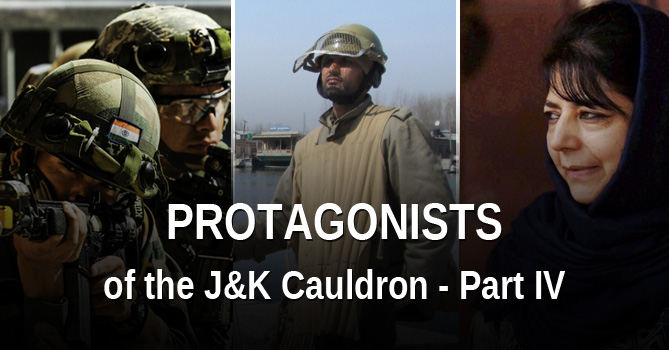Continued from previous post, Movers and Shakers of Kashmir – Part 3
People of P-O-K
The people of Gilgit and Baltistan in Pakistan Occupied Kashmir (P-O-K) are an unfortunate lot. During 1947-48, they were forcefully occupied by the Pakistan Army and ever since, their voice, culture, freedom and economic development have all been suppressed by the Pakistani state. The people continue to suffer under Pak Army’s brutality as they try and continue with existential living.
Read : India Pakistan Border Dispute
If the separatists of J&K feel that Kashmiris on the Indian side are suppressed or have not benefitted from significant investment and development in the state, then they must visit P-O-K and see for themselves to realize their fortune in their side of Kashmir.
Most do realize it, but they won’t admit it in public. Symbolic gestures such as raising of Pakistani flags (and the like) are only to spite the Indian forces and most don’t share any goodwill towards Pakistan. On the other side, though, lives remain without hope.
The Government of India
Right since 1947 onwards, the Kashmir situation has been mishandled by the powers in New Delhi, which has kept the problem unresolved due to political procrastination. The bureaucracy in India must also share the blame with political leaders at the centre and state for allowing the problem to fester.
It is, after all, the respective governments at the Centre that successfully conducted Sikkim’s accession to India, ensured peace for years in Arunachal Pradesh and negotiated several peace agreements in Nagaland, Manipur and other parts of North East. So why has its failed in J&K?
The biggest fault of the Centre has been to allow the Abdullah family to run the state, by continually infusing hard-earned tax-payer’s money, collected from rest of India, into the state. Most of this money found its way into the pockets of those closely connected with the ruling family and party, and have included grass-roots political leaders, bureaucrats, police and select businessmen.
A large part of funds from Centre never made it to the grass-roots level it was intended for; therefore, the accusation is largely true that development benefits did not spread wide and deep within the state. As a result, people feel let down by every subsequent government at the Centre and state.
It will require genuine freedom to the local people of the state to have a say in their future, the leadership and developmental agenda, but within the framework of the Indian constitution, for any hope of a solution. Given the deep animosity and mistrust prevailing in the state, that seems highly unlikely, at least in the near term.
State Government of Jammu and Kashmir
Sheikh Abdullah was the right person who represented the aspirations of the local people at the time. But his long incarceration and subsequent induction into power just to buy peace, led to disillusionment amongst the people. His early years were in the right earnest, but he, too, fell for the ‘family first’ agenda. After his death, the Centre’s propping up of his son, Farooq Abdullah, was yet another failure on the part of the nation. Farooq’s son, Omar Abdullah simply carried on what had by now become a family business.
In the state, only the Abdullah family and their crony capitalist friends benefitted from the limited business opportunities that the state offered. The common man largely remained outside the circle of benefit.
The present-day coalition government of PDP-BJP, led by Mehbooba Mufti, is no better. The coming to power with support of the BJP — a party viewed with deep suspicion in the state, and which is at complete divergence in ideology with PDP — has only increased the frustration of the people.
But power is both necessary and addictive. If the Abdullah family made the state its business playground, the Muftis are now trying hard to take over that legacy.
Large sections of the bureaucracy have been corrupt, with several having deep sympathy with the separatists. Earlier, they used to maintain a low profile but of late, they have become more assertive and brazen about where their sympathies lie.
Meanwhile, the common man remains frustrated and indulges in stone pelting and raising pro-Pakistani slogans and flags to spite the Indian authority. The impasse carries on without any solution in sight.
The Indian Army
The Indian Army has been caught between political games being played by the Centre and the state. Despite not having any real say in the political settlement process in the state and having its one hand tied by the powers that be; it’s the Army that has been largely responsible for whatever development that has taken place in the state.
Read : Indian Army Ranks and Recruitment Process
Infrastructure projects in interior parts of J&K such as roads, bridges, shelters, etc, have all been provided by the Army. They have built schools, distributed learning materials and provided trained teachers to deliver quality education in remote parts.
Dispensaries and hospitals are providing medical care to local Kashmiris, who respect the Army for what they have done and are still doing. The people’s frustration is with the state and central authority.
The price of political procrastination over the years has been paid by the Army through hundreds of lives that have been fruitlessly lost and this carries on with no end in sight.
Paramilitary forces – BSF and CRPF
For years together, the Army has been conducting operations that should have been the purview of the local police and at times, paramilitary forces. The induction of paramilitary forces along with local police to maintain daily law and order is a more recent phenomenon that has offered some respite to the Army. Like the Army, the paramilitary forces, too, are overworked and overstressed, risking their lives to serve a state where no one cares to recognize nor appreciate their role and sacrifice.
J&K Police
The J&K Police, like in most other states, function mostly as a security arm of the ruling party than operate as a free and just law and order authority working for the welfare of the people.
The J&K Police, for most years, has largely failed in its role to police the state and in maintaining law and order. Add to this rampant corruption, along with infiltration by separatists, who have sympathizers working within the police establishment.
It’s only in recent years that J&K Police has been playing a vital role, as many have themselves been on the receiving end of terrorist activities. Today, the J&K police is far more professional and active in the state. And if a solution to the Kashmir issue is found, it will be the police that will play a vital role in maintaining subsequent peace in the state.
Final onus lies with the Movers and Shakers
The Movers and Shakers have all contributed in some way to the continuing situation in Kashmir. It is time that all accepted their responsibility and came together to find a solution for people that they all profess to care.
It is time for the circle of violence to stop. It is time for the people themselves to understand the reality of geo-politics and look for a solution within the framework of pragmatic reality. Let all stakeholders seize the initiative to sit down in right earnest and ensure that the next generation grows up in a world of peace and prosperity that Kashmir was always meant to be.
Must Read:
Protagonists of Jammu and Kashmir Cauldron – Part 1
Protagonists of Jammu and Kashmir Cauldron – Part 2
Explore More:
Farooq Abdullah Doubts India’s Legitimacy Over Kashmir, but Why?
Pakistani Actors Banned: Bollywood Opinion on Pak Artists Ban
Uri – an attack on India; it’s a call to action
Indus Water Treaty Between India and Pakistan
India Surgical Strikes Against Pak Across LoC
#UriAttack 18/9: Is It Time for Pak to Pack Up?
Interesting Facts About Indian Army
Can The Kashmir Issue Be Ever Resolved Through Peace Talks?
Who was Burhan Wani
Government’s Outreach to Youth From Kashmir
The NIT Srinagar Issue
Militant Groups in India
Kishtwar: Another Burning Chapter in Kashmir
Article 370 of Indian Constitution – Historical Background and Provisions
Headley’s Deposition in 26/11 Mumbai Terror Attack : Interesting Facts & Diclosures
26/11 Mumbai Terror Attack: Details Review, Reasons & Facts
The Pathankot Terror Attack: An Analysis
Top 10 Terror Attacks in India
India’s 10 Most Wanted Men
Most Active Militant Groups in India
Terror of Drones – Deadly weapon in hands of Terrorists
How is India preparing to counter the ISIS threat?
Terror Attacks: Has Jihadi Movement Come to Northeast?
Is ISIS a threat to India?
Why do our youth want to join ISIS?
Z Plus Security
Cross border firing Issue between India and Pakistan
West Bengal – Why It’s Called A Safe Haven For Terrorists?
Terrorist Attacks in India – New use of cycle
Hindu-Muslim Relationship
India’s 10 Most Wanted Men





